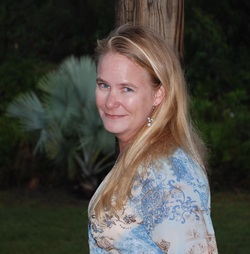Angelina Jolie has it. So does Christina Applegate. And Sharon Osbourne. And so do thousands of other, less-famous women, who are walking around with a walking time bomb in their genes.
The BRCA genes, when acting the way they are supposed to do, suppress tumors in the breasts and ovaries. When they don’t act the way they are supposed to… well that’s equivalent to a bunch of genes running around wringing their hands saying I duuno, what do I do? as malignant tumors grow.
While only five to ten percent of breast cancers diagnosed in the US are linked to an inherited mutation, in the women who do have a gene mutation, the chance of dying of cancer climbs in a very ominous way. My interest in telling Erin’s story was sparked when I read an article about a mother who tested positive the BRCA gene, and was facing the heartbreaking prospect of how to share the news with her teenage daughters. I’ve cried more than I can even remember as I wrote Positively Beautiful, because the choices these women face are horrendous: living with the knowledge of carrying an upwards of 80% chance of getting breast cancer in their lifetime (and ovarian cancer as well, though the chances are a bit lower), or undergoing a double mastectomy and oophorectomy (removal of ovaries) to risk the chance of cancer.
I wanted to know how a girl, just an ordinary girl, would deal with the news that she could be carrying this gene. How would it affect her life, her choices, her dreams for the future? Because though the news of a genetic mutation would be devastating, there are still parties to go to, school to survive, boys to fall for. How distorted would your life seem if you were seeing it through a lens colored by sickness and death? How would that cancerous knowledge affect the way you live?
This is just one girl’s story; thousands of women are looking into this crystal ball every day and making their own hard choices. They are brave, they are scared, and they are being forced into making hard, life-changing decisions. I admire each and every one of them for waking up every day and saying: This is my life, and I’m going to live it the best way I know how. Because, in the end, what choice do they have? We can’t control the genetic hand that life has dealt us, but we can choose how we live that life.
Would you want to know, if you had the choice?
The BRCA genes, when acting the way they are supposed to do, suppress tumors in the breasts and ovaries. When they don’t act the way they are supposed to… well that’s equivalent to a bunch of genes running around wringing their hands saying I duuno, what do I do? as malignant tumors grow.
While only five to ten percent of breast cancers diagnosed in the US are linked to an inherited mutation, in the women who do have a gene mutation, the chance of dying of cancer climbs in a very ominous way. My interest in telling Erin’s story was sparked when I read an article about a mother who tested positive the BRCA gene, and was facing the heartbreaking prospect of how to share the news with her teenage daughters. I’ve cried more than I can even remember as I wrote Positively Beautiful, because the choices these women face are horrendous: living with the knowledge of carrying an upwards of 80% chance of getting breast cancer in their lifetime (and ovarian cancer as well, though the chances are a bit lower), or undergoing a double mastectomy and oophorectomy (removal of ovaries) to risk the chance of cancer.
I wanted to know how a girl, just an ordinary girl, would deal with the news that she could be carrying this gene. How would it affect her life, her choices, her dreams for the future? Because though the news of a genetic mutation would be devastating, there are still parties to go to, school to survive, boys to fall for. How distorted would your life seem if you were seeing it through a lens colored by sickness and death? How would that cancerous knowledge affect the way you live?
This is just one girl’s story; thousands of women are looking into this crystal ball every day and making their own hard choices. They are brave, they are scared, and they are being forced into making hard, life-changing decisions. I admire each and every one of them for waking up every day and saying: This is my life, and I’m going to live it the best way I know how. Because, in the end, what choice do they have? We can’t control the genetic hand that life has dealt us, but we can choose how we live that life.
Would you want to know, if you had the choice?

 RSS Feed
RSS Feed